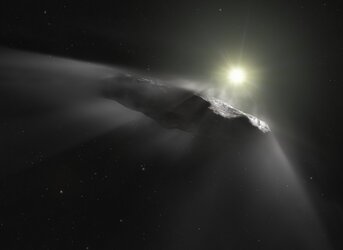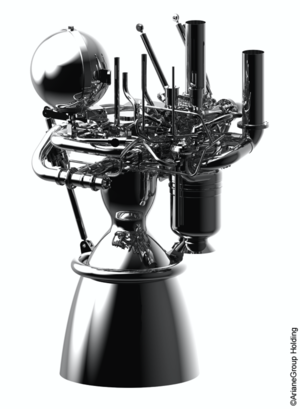N° 37–2024: Media invitation: Media briefing on 'Fly!' feasibility study with John McFall
15 July 2024
Journalists are cordially invited to a virtual media briefing with ESA Director of Human and Robotic Exploration and Member of the ESA Astronaut Reserve John McFall on Friday, 19 July from 13:00-14:00 BST/14:00-15:00 CEST.
Updates on ESA’s Fly! Feasibility Study will be shared during the briefing.
Announced in November 2022 during the Ministerial Council held in Paris, this unique and groundbreaking study is aimed at understanding and challenging the limitations posed by physical disabilities to human spaceflight.
Fly! is underpinned by the desire to ensure that space exploration is not limited by physical constraints and that every individual can contribute to our collective understanding of the cosmos and of the benefits of spaceflight for life on Earth.
Former paralympic athlete and orthopaedic surgeon John McFall (UK), who suffered a lower limb amputation at age 19, was selected to join ESA’s Astronaut Reserve. He is also a Subject Matter Expert in the Fly! Feasibility Study.
Since June 2023, John has been participating in key familiarisation classes and activities at the European Astronaut Centre (EAC), aimed at exploring the specific challenges that his disability might pose for spaceflight.
The Fly! Study will conclude in Autumn 2024.
Programme
Friday 19 July, 13:00 BST/14:00 CEST: online media briefing in English
Participants:
Daniel Neuenschwander, Director of Human and Robotic Exploration
John McFall, Member of the ESA Astronaut Reserve
Jerome Reineix, Fly! Feasibility Study Manager
Media registration
Media representatives are invited to register their attendance by Thursday, 18 July 2024, 17:00 BST/18:00 CEST via https://blogs.esa.int/forms/esa-media-briefing-form/ . Registered media will receive the TEAMS link for the briefing on Friday, 19 July via email.
One-to-one interviews should be requested via media@esa.int
More information
Daniel Neuenschwander Biography
Images
https://www.esa.int/ESA_Multimedia/Search?SearchText=john+mcfall&result_type=images
ESA's Photo Library for Professionals:
https://photolibrary.esa.int/collection/?sid=lbvdj14m1
Terms and conditions for using ESA images:
www.esa.int/spaceinimages/ESA_Multimedia/Copyright_Notice_Images
For questions or more information related to ESA images, please contact directly spaceinimages@esa.int.
Videos
https://www.esa.int/ESA_Multimedia/Search?SearchText=john+mcfall&result_type=videos
ESA's Video Library for Professionals:
https://www.esa.int/esatv/Videos_for_Professionals
Terms and conditions for using ESA videos:
https://www.esa.int/spaceinvideos/Terms_and_Conditions
For questions or more information related to ESA videos, please contact directly spaceinvideos@esa.int.
Social Media
Follow ESA on:
Twitter: @ESA @AstroJohnMcFall @iamfivetoes
Instagram: Europeanspaceagency John McFall
Facebook: EuropeanSpaceAgency John McFall
YouTube: ESA
LinkedIn: European Space Agency - ESA Daniel Neuenschwander | LinkedIn
Pinterest: European Space Agency - ESA
About the European Space Agency
The European Space Agency (ESA) provides Europe’s gateway to space.
ESA is an intergovernmental organisation, created in 1975, with the mission to shape the development of Europe’s space capability and ensure that investment in space delivers benefits to the citizens of Europe and the world.
ESA has 22 Member States: Austria, Belgium, the Czech Republic, Denmark, Estonia, Finland, France, Germany, Greece, Hungary, Ireland, Italy, Luxembourg, the Netherlands, Norway, Poland, Portugal, Romania, Spain, Sweden, Switzerland and the United Kingdom. Latvia, Lithuania, Slovakia and Slovenia are Associate Members.
ESA has established formal cooperation with four Member States of the EU. Canada takes part in some ESA programmes under a Cooperation Agreement.
By coordinating the financial and intellectual resources of its members, ESA can undertake programmes and activities far beyond the scope of any single European country. It is working in particular with the EU on implementing the Galileo and Copernicus programmes as well as with Eumetsat for the development of meteorological missions.
Learn more about ESA at www.esa.int















 Germany
Germany
 Austria
Austria
 Belgium
Belgium
 Denmark
Denmark
 Spain
Spain
 Estonia
Estonia
 Finland
Finland
 France
France
 Greece
Greece
 Hungary
Hungary
 Ireland
Ireland
 Italy
Italy
 Luxembourg
Luxembourg
 Norway
Norway
 The Netherlands
The Netherlands
 Poland
Poland
 Portugal
Portugal
 Czechia
Czechia
 Romania
Romania
 United Kingdom
United Kingdom
 Slovenia
Slovenia
 Sweden
Sweden
 Switzerland
Switzerland

























